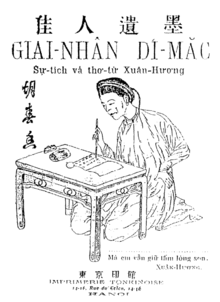Hồ Xuân Hương

Hồ Xuân Hương (胡春香; 1772–1822) was a Vietnamese poet born at the end of the Lê dynasty. She grew up in an era of political and social turmoil – the time of the Tây Sơn rebellion and a three-decade civil war that led to Nguyễn Ánh seizing power as Emperor Gia Long and starting the Nguyễn dynasty. She wrote poetry using chữ nôm (Southern Script), which adapts Chinese characters for writing demotic Vietnamese. She is considered to be one of Vietnam's greatest classical poet. Xuân Diệu, a prominent modern poet, dubbed her "The Queen of Nôm poetry".
Biography
The facts of her life are difficult to verify, but this much is well established: she was born in Nghệ An Province near the end of the rule of the Trịnh lords, and moved to Hanoi while still a child. The best guess is that she was the youngest daughter of Ho Phi Dien.
According to the first researchers of Hồ Xuân Hương, such as Nguyen Huu Tien and Duong Quang Ham, she was a daughter of a Ho Phi Dien (born in 1704) in Quynh Doi Village, Quynh Luu District, Nghệ An Province (*). Ho Phi Dien acquired the baccalaureate diploma at the age of 24, under Le Bao Thai's Dynasty. Due to his family's poverty, he had to work as a tutor in Hai Hung, Ha Bac for his earnings. At that place, he cohabitated with a girl from Bac Ninh, his concubine – Hồ Xuân Hương was born as a result of that love affair.
Nevertheless, in a paper in Literature Magazine (No. 10, Hanoi 1964), Tran Thanh Mai claims that Hồ Xuân Hương's hometown was the same as mentioned above, but she was a daughter of Ho Si Danh (1706–1783) and a younger stepsister of Ho Si Dong (1738–1786)"
She became locally famous and obtained a reputation of creating poems that were subtle and witty. She is believed to have married twice as her poems refer to two different husbands: Vinh Tuong (a local official) and Tong Coc (a slightly higher level official). She was the second-rank wife of Tong Coc, in Western terms, a concubine, a role that she was clearly not happy with ("like the maid/but without the pay"). However, her second marriage did not last long as Tong Coc died just six months after the wedding.
She lived the remainder of her life in a small house near the West Lake in Hanoi. She had visitors, often fellow poets, including two specifically named men: Scholar Ton Phong Thi and a man only identified as "The Imperial Tutor of the Nguyễn Family." She was able to make a living as a teacher and evidently was able to travel since she composed poems about several places in Northern Vietnam.
A single woman in a Confucian society, her works show her to be independent-minded and resistant to societal norms, especially through her socio-political commentaries and her use of frank sexual humor and expressions. Her poems are usually irreverent, full of double entendres, and erudite.[1]
Legacy
By composing the vast majority of her works in Nôm, she helped to elevate the status of Vietnamese as a literary language. Recently, however, some of her poems have been found which were composed in classical Chinese, indicating that she was not a purist. In modern times, Chữ nôm is nearly a dead script, having been supplanted by Quốc Ngữ, a Latin alphabet introduced during the period of French colonization. For details, see Vietnamese language. Some of her poems were collected and translated into English in John Balaban's Spring Essence (Copper Canyon Press, 2000, ISBN 1 55659 148 9).
An important Vietnamese poet and her contemporary is Nguyễn Du, who similarly wrote poetry in demotic Vietnamese, and so helped to found a national literature.
Most cities in Vietnam have a major street named after Hồ Xuân Hương.[2]
Quotes
"My body is like the jackfruit,
Its skin prickly, its meat thick.
If you want to test it, then drive in your stake,
Don't fondle the surface, or sap will stain your hand."
("The Jackfruit")
Because I pitied, this happened,
I wonder if he knows?
Our match had not begun
When fate intervened.
The sin he will have to bear, for a hundred years -
Right now, love's burden is all mine.
("Premarital Pregnancy")
Ðằng Kingdom is now a small place
Between Sở and Tề.
("The Kingdom of Ðằng")
Gently Spring evening comes to the pavilion,
Unclouded in the least by worldly sins.
Three times the temple's bell surges like a wave
Unsettling the puddle where sky and water mingle.
Truly the sea of Love cannot be emptied
And the stream of Grace flows easily everywhere.
Now, where, where is Nirvana?
Nirvana's here, nine parts in ten.
("Spring Watching Pavilion")
References
Sources
- Forbes, Andrew, and Henley, David: Vietnam Past and Present: The North (History and culture of Hanoi and Tonkin). Chiang Mai. Cognoscenti Books, 2012.
- Outstanding Vietnamese Women Before the 20th Century published in English by The Gioi Publishers, 2006.
- Hồ Xuân Hương, nha tho cach mang (Hồ Xuân Hương - A Revolutionary Poet) by Hoa Bang, 1982.
External links
| Wikimedia Commons has media related to Hồ Xuân Hương. |
- John Balaban's translations of Hồ Xuân Hương's works into English
- New York Times review of the translation, with background information
- NPR Interview with John Balaban